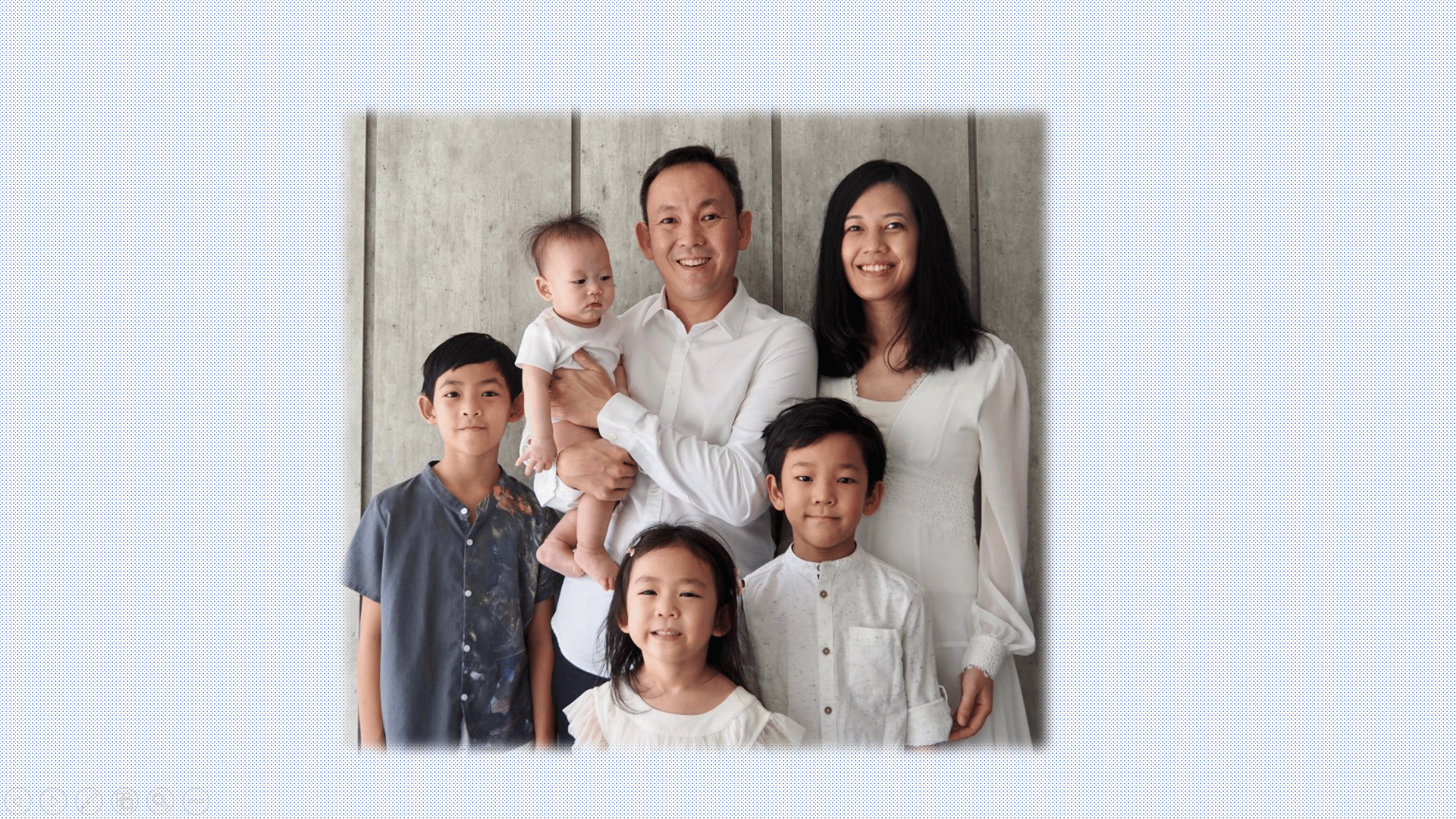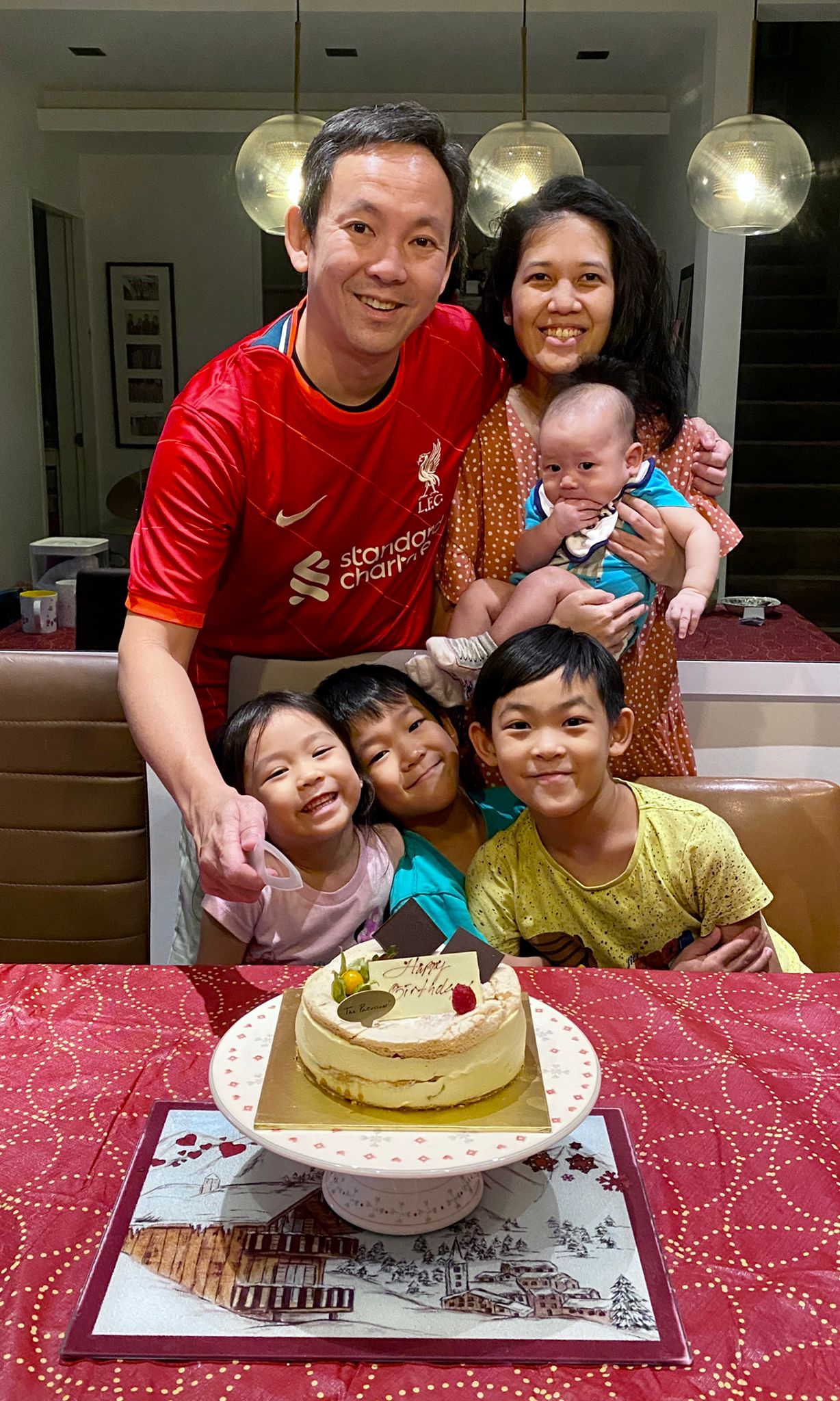“I was going through my worst in five years”: Busy parents talk about dealing with burnout in Salt&Light Family Night
by Christine Leow // July 5, 2022, 12:31 pm

Founder and CEO of ABRY, Adriana Lim Escaño, who is married to the CEO of Centre for Fathering Bryan Tan, went through a season of fatigue raising her four children, serving in ministry and running her business. Photo courtesy of Bryan Tan.
Adriana Lim Escaño is a woman with many responsibilities.
She is the CEO of ABRY, an award-winning distributor and retailer of luxury, fashion and lifestyle brands she founded 14 years ago. She is also the co-founder of Mums for Life, a ground-up movement to celebrate a mum’s unique identity as a woman and affirm her irreplaceable role as a daughter, wife and mother.
Last year, Adriana welcomed her fourth child, a son. Her children are aged between 18 months and 12 years.
“I’ve realised that I have many ambitions and I am very passionate about what I do. It’s frustrating and disappointing when I cannot pursue all the ambition that I want.”
Adriana shared this on Salt&Light Family Night (June 28). She and her husband Bryan were part of the panel discussing the topic: How do I serve the church while raising my children?
Tired and drained
In May this year, Adriana found herself “emotionally, mentally in a pit”.
“I was going through my worst in five years. I felt very tired, very drained. I felt like I was doing so much.
“I told my husband, ‘Just be in the pit with me and walk out of the pit together. Just don’t leave me in the pit alone.’”
“I had resignations from managers who told me that I didn’t spend enough time with them. I had work that I just never could finish, never up to standard.
“When I came home, I was tired and I felt like I had four screaming kids in my head. I was just fatigued.”
Her husband Bryan Tan, the CEO for Centre for Fathering, was also going through a tough time.
“I told Bryan, ‘Just be in the pit with me and walk out of the pit together. Just don’t leave me in the pit alone.’”
Adriana also “reached into that deep place every day with Father God” and found both strength and solace in Him.

Adriana, seen here with her husband Bryan and their four children, found a solace and strength in her faith that lifted her from her fatigue.
“I always find myself looking through my lens and I am always frustrated.
“If I look at the level of my lens, on that level, everything is human, mundane, mostly it will be negative.
“God’s Word is amazing. You just chew on one sentence and the sentence has so much revelation and power for the day.”
“But when I look up and say, ‘God, what is Your truth for today’, His Word is amazing. You just chew on one sentence and the sentence has so much revelation and power for the day. I find that sustains me through the day.”
Encouraging mothers to remain upbeat, Adriana added: “I truly believe that a happy mum is a strong mum. A happy mum makes a happy home. The world may fall apart and the weather change but we need to be that warmth in the house and that thermostat.”
Joining Adriana and Bryan on the Salt&Light Family Night panel on June 28 were Pastors Simon and Ping Chua, co-founders of the New Life Community Church. They have five children aged 21 to 30.
Some 100 people logged in to the Zoom chat show. More than half (64%) were parents with children six years and younger. A quarter had primary-school going children. Those with teens as well as children older than 18 made up 14%. In the minority (5%) were parents with adult children. Among the parents, there were more mums than dads (63% vs 25%).
Striking that balance between ministry and family
Salt&Light Family Night participants were asked about their greatest concern when allocating time to ministry and family. “Time” was the most common answer.
In answering questions about managing church and children, the panellists shared their tips
1. Be present
The Chuas hold to the value of having one parent home full-time with the children.
“I told my husband, ‘If you want to have kids, one of us has to stay home,” said Ps Ping.
She had grown up with a stay-home mum. So, she had purposed in her heart to provide the same for her children even before she got married.
“I want my children to be arrow heads in the kingdom of God. If I’m not there to guide them, then who would?
“We want to build our children, not repair them.”

Ps Simon and Ps Ping Chua (centre) believe in being actively involved in raising their children and getting them to be involved in their ministry. Photo courtesy of Ps Simon Chua.
Now, when conducting parenting seminars, she encourages couples to set aside at least three, preferably seven years, for one parent to be home with the children.
“Changing diapers is the most important thing to the child – the touch, the feel, the knowing. The caregiver in their lives will have the most importance.
“I want my children to be arrow heads in the kingdom of God.”
“If the caregiver is the helper, then they will have those values. If it is your mum and your mother-in-law, they will also have that value.
“So, if they behave differently from the way you want them to, you cannot be upset with them because you never invested that time with them. There is a price in everything you do.”
In the initial years, living on one income was not easy. But it was a sacrifice they willingly made.
Said Ps Simon: “If you have kids, there will be sacrifice. There must be an exchange. What do you want? What kind of return do you want to get in your life?
“With every year that passes, everything that you do, there is a return that you get in the time that you put into something. For us, the kids are our best investment.”
But the Chuas are going beyond their own children. They are sowing into the next generation.
“I gave my daughters talents so they can work from home if they want to,” said Ps Ping.
2. Be stewards
Bryan is keenly aware of the fact that he is a steward of his children. This has made him “very intentional” about discerning what God is doing in his children’s lives instead of imposing his own ambitions on them.
“God is really steps ahead in what He is doing for them. He’s already prepared them. He has already put in the talents, the gifts, the dreams in them.
“They get to validate every single thing they have learnt in their formative years. And they don’t have to refer just to peers or the world.”
“I have to renounce my ambition for them. I’ve got to release them to dream God’s dream.”
What Bryan does is to partner God to bring forth His plans in his children’s lives by guiding and coaching them, and instilling in them with discipline.
He also ensures that his children have at least five godly mentors in their lives who are equally invested in their well-being.
“So that as they move, they get to validate everything Adriana and I share with them. They get to validate the values that we hold dear. They get to validate every single thing they have learnt in their formative years.
“And they don’t have to refer just to peers or the world, to accept just any world view that comes in because they have some trusted adults in their lives whom they can validate some of these things with. So, that will provide that scaffold for them to remain and draw in the community.”
3. Be intentional
Like the Tans, the Chuas also believe in building discipline when the children are young. But when they hit their teens, imparting spiritual values become important.
In their household, three key values are taught.
“We build these fruits so that the inside will build character.”
The first is commitment. The children are encouraged to finish what they start. The second is excellence – “do it well, do your best and leave the rest to God”. Finally, honour. His children are taught to honour their parents (Exodus 20:12) in the way they speak and approach them.
Said Ps Simon: “Values are very important because once you have values, even if I’m dead tomorrow, they have these values instilled in their lives.
“These are their belief systems. Then, I think they will be fine because they know where the line ends, where they do not cross their lines.”
For the Tans, instead of rewarding behaviour, they reward their children based on the fruit of the Spirit that they exhibit to encourage them to live out their lives in accordance with the character of the Spirit.
“We build these fruits so that the inside will build character, will build who they are. And it gives them the power and the victory to exercise that authority on earth that He has called us to.”
4. Build security
The Chuas also made sure their children are secure in their identity in Christ.
“They know how loved they are by God. They know how loved they are by Daddy and Mummy.
“Their identity is so strong in knowing who Father God is and knowing who we are to them, as much as possible, they become secure,” said Ps Simon.
Each night, as they tucked their children into bed, they would teach their children that they are loved for who they are.
“We ask then, ‘Why does Mummy and Daddy love you?’ And they would say, ‘Because I’m Sarah.’ Every night,” said Ps Ping.
5. Be authentic
The Tans also “consciously try to demonstrate authenticity”. They do not shy away from being vulnerable in front of their children.
“Sometimes, we fall on our faces. But it is how we get up.”
“When we cry out to the Lord, sometimes we do this in the presence of our kids,” said Bryan.
“We are very intentional about helping our kids understand the moments we fall, when we fail as a person. They see the worst of me, especially in the past two years, in the workplace setting, in the community and, sometimes, in my relationship with their mum.
“I had so many opportunities of failing that I needed to be able to to use them as learning moments as best as I can to show them that life is not rosy, life is not easy.
“Sometimes, we fall on our faces. But it is how we get up. It’s how we try to seek restitution. It’s how we try to restore the peace, harmony and trust at home.”
6. Model faith
Adriana tries to help her children “experience God in the everyday” as the day unwinds.
“God is ever so present. God’s presence is always upon us. God always has surprises if we let just have space to let Him come in.
“Once you let them experience God, you can’t run away from something you have tasted.”
“So, what I try to do is to just give that space for God to be who He is and point out to them, ‘See God’s there. God is doing this. This is coming from God. What do you think?’
“So that they can try to have their own relationship with Him, their own discovery and their own journey with God. I try to facilitate that as much as possible.
“Whatever time I have, if I can bring them closer to their heavenly Father, that’s my wish. And I think God knows that. Once you let them experience God, you can’t run away from something you have tasted.”
Bryan models prayerfulness for his children. Whenever he drives them around, he would encourage them to recite Psalm 91 as a prayer. Because this is done so often, his third child has picked it up and is able to recite the Psalm along with her siblings.
He also encourages his children to pray for him. His children get a thrill from the opportunity to put their hands on his head as they do so.
“A lot of those prayers they pick up from Mummy, they are able to apply them to me. I’ve learnt to accept prayers from my kids.”
6. Model ministry
The way the Chuas serve all these years was influenced by their commitment to be present for their children.
“Ministry is me being with God and them,” said Ps Ping. “I would bring my children along with me and do stuff. So, I never struggled to balance children and the church.”
Today, all their five children are grown up and serving in church.
7. Involve the children
From the moment her children could speak, Adriana would get them to pray. On one occasion, she encouraged her oldest son, who was only about five years old, to pray for the son of a friend who had cancer. When the child was healed of the rare form of cancer a year later, Adriana’s son remembered he had prayed and was able to see how God answered.
When Adriana’s father was trying to get a Singapore citizenship, the children were roped in to pray for him as well. After being rejected twice, he was successful and Adriana used it as an opportunity to teach her children about prayer and God’s faithfulness.
“I try to involve them in everything that they can pray for because you are just going to experience God. The moment you have tasted it, no one can rob you of that.”
8. Parent your teens differently
Ps Simon cautioned that when children hit the teen years, things will change.
“The way you raise your children from one to 12 is completely different. From 12 onwards, it’s almost like the Sunday School, children’s church is completely all wasted because they have just rebelled and gone their way.”
“After 21, hopefully you’ll be their best friend.”
As children turn from tween to teens, letting go is essential.
“The children at that age onwards have to find God for themselves. You cannot force God on them.”
God called Himself the God of Abraham, the God of Isaac and the God of Jacob because each generation had to discover God for themselves, added Ps Simon.
“For those before Sec 1, you are their instructor. From Sec 1 to 21, you are their mentor. After 21, hopefully, you’ll be their best friend,” said Ps Simon, encouraging viewers to adopt an age-appropriate way of raising children.
He offered three ways to manage the teen years.
1. Don’t pressure them
“Your children cannot feel pressure for them to be a Christian child,” said Ps Simon.
This is especially pertinent to children of church leaders such as pastor’s children.
“I always tell my kids, ‘You can be who you want to be. If you make a mistake, you are Simon and Ping’s child. You are not the pastor’s kids.’”
When the pressure to perform comes from well-meaning church members, the Chuas talk to these adults and encourage them to extend the children grace and “let them be kids”.
2. Be humble
“The way to restore your kids back to God if you have done many mistakes, which I have, is Daddy must learn to apologise. When you are a dad and you apologise to the kids, the grace that your children have for you as Daddy is incomparable to anybody else in the world, even your wife,” said Ps Simon.
“If you beat them wrongly, you scold them wrongly, you go to them and say, ‘Daddy is sorry. I apologise. I was wrong.’ Describe why I was wrong. They may rebel but you have just brought them closer to God.”
3. Give them space
When their oldest daughter was a teen, she struggled with following her parents to church over the weekends.
Ps Ping gave her some leeway.
“I let them be and I let them grow and be with other people in the church.”
“I told her, ‘If you can tell Mummy, Daddy if you have something special to do, we will let you go. If not, we would like you to be with us.’”
Added Ps Simon: “It’s about trying to allow them that space, to not accept what they want to do. But at the same time to still have that love for them so that eventually when they need you, they need God, you are still there for them.”
When their children were teens, Ps Ping taught them how to spend Quiet Time with God. But she let them set their own pace.
“I never asked them if they did it. I let them be and I let them grow and be with other people in the church.”
This report is Part 2 of the Salt&Light Family Night episode on How do I serve the church while raising my kids? You can read Part 1 here.
A full recording of this episode will be posted on the Salt&Light YouTube channel at the end of the week. You can watch past episodes of Salt&Light Family Night on our YouTube channel here.
We are an independent, non-profit organisation that relies on the generosity of our readers, such as yourself, to continue serving the kingdom. Every dollar donated goes directly back into our editorial coverage.
Would you consider partnering with us in our kingdom work by supporting us financially, either as a one-off donation, or a recurring pledge?
Support Salt&Light



